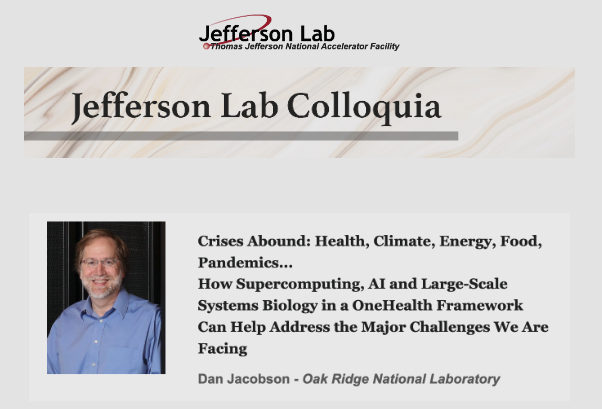Abstract: The cost of generating biological data is dropping exponentially, resulting in an explosion in the amount of data available for the biological sciences. This flood of data has opened a new era of systems biology in which there are unprecedented opportunities to gain insights into complex biological systems. Integrated biological models need to capture the higher order complexity of the interactions among cellular components. Solving such complex combinatorial problems will give us extraordinary levels of understanding of biological systems.
Paradoxically, understanding higher order sets of relationships among biological objects leads to a combinatorial explosion in the search space of biological data. These exponentially increasing volumes of data, combined with the desire to model more and more sophisticated sets of relationships within a cell, across an organism and up to ecosystems and, in fact, climatological scales, have led to a need for computational resources and sophisticated algorithms that can make use of such datasets. The disease, traits or phenotypes of an organism, including its adaptation to its surrounding environment and the interactions with its microbiome, are the result of orchestrated, hierarchical, heterogeneous collections of expressed genomic variants regulated by and related to biotic and abiotic signals.
However, the effects of these variants can be viewed as the result of historic selective pressure and current environmental as well as epigenetic interactions, and, as such, their co-occurrence can be seen as omics-wide associations in a number of different manners. We have developed supercomputing and explainable-AI approaches to find complex mechanisms responsible for all measurable phenotypes as well as an organism’s ability to detect and modulate its microbiome.
The result is progress towards a comprehensive systems biology model of an organism and how it has adapted to and responds to its abiotic and biotic environment which has applications in bioenergy, precision agriculture, ecosystem studies, precision medicine, and pandemic prevention among other disciplines.
Biography: Dan Jacobsons’s career as a computational systems biologist has included leadership roles in academic, corporate, NGO and national lab settings. His research focuses on understanding the complex sets of interactions of molecules of all types (across all omics layers) in cells that lead to phenotypes, traits and disease states in organisms and how all of that is conditional on the surrounding environment. Dan’s lab was the first group to perform an exascale calculation and holds the current record for the fastest calculation done in human history (9.4 Exaflops).
For his recent work Dan has been awarded the Secretary of Energy Honor Award: The Secretary of Energy’s Achievement Award; HPCWire Editor’s Choice Award for the Top HPC-enabled Scientific Achievement; the Gordon Bell Prize; Oak Ridge National Laboratory, Director’s Award; Oak Ridge National Laboratory, Outstanding Achievement Award; and a Joint Citation from the Department of Energy and the Department of Veteran Affairs.
Wednesday, July 19, 2023
3:30-4 p.m. for refreshments – 4-5 p.m. for presentation
CEBAF Center Auditorium
Zoom option is also available.
Zoom – Meeting ID: 160 478 1138 – Passcode: 653777




